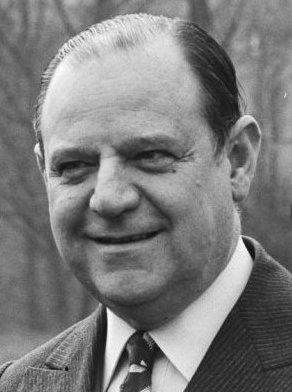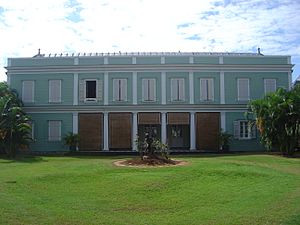Raymond Barre facts for kids
Quick facts for kids
Raymond Barre
|
|
|---|---|
 |
|
| Prime Minister of France | |
| In office 25 August 1976 – 21 May 1981 |
|
| President | Valéry Giscard d'Estaing |
| Preceded by | Jacques Chirac |
| Succeeded by | Pierre Mauroy |
| Mayor of Lyon | |
| In office 25 June 1995 – 25 March 2001 |
|
| Preceded by | Michel Noir |
| Succeeded by | Gérard Collomb |
| Minister of the Economy and Finance | |
| In office 27 August 1976 – 5 April 1978 |
|
| Prime Minister | Himself |
| Preceded by | Jean-Pierre Fourcade |
| Succeeded by | René Monory |
| Minister of Foreign Trade | |
| In office 12 January 1976 – 25 August 1976 |
|
| Prime Minister | Jacques Chirac |
| Preceded by | Norbert Ségard |
| Succeeded by | André Rossi |
| European Commissioner for Economic and Financial Affairs | |
| In office 7 February 1967 – 5 January 1973 |
|
| President | Jean Rey Franco Maria Malfatti Sicco Mansholt |
| Preceded by | Robert Marjolin |
| Succeeded by | Wilhelm Haferkamp |
| Personal details | |
| Born |
Raymond Octave Joseph Barre
12 April 1924 St-Denis, France |
| Died | 25 August 2007 (aged 83) Paris, France |
| Political party | Independent, affiliated with UDF |
Raymond Octave Joseph Barre (French: [ʁɛmɔ̃ baʁ]; 12 April 1924 – 25 August 2007) was an important French politician and economist. He was a Vice President of the European Commission and a Commissioner for Economic and Financial Affairs. Later, he became the Prime Minister under President Valéry Giscard d'Estaing from 1976 to 1981.
In 1988, he ran for president but finished third. Raymond Barre was born in Saint-Denis, on the French island of Réunion. At the time, Réunion was a colony, but it became an overseas department in 1946.
Contents
Raymond Barre's Career Journey
Early Professional Life
After finishing his studies, Raymond Barre became an economics professor. He taught at the Institut d'Etudes Politiques de Paris (often called Sciences Po) and École Centrale Paris.
From 1959 to 1962, he worked as a director for Jean-Marcel Jeanneney in the Ministry of Industry and Trade. In 1967, President Charles de Gaulle chose him for a big role. He became the Vice-President of the European Commission for Economic and Financial Affairs. He worked in Brussels until January 1973.
After returning to France, he joined the government as the Minister of External Trade in January 1976.
Becoming Prime Minister
Seven months later, in August 1976, President Valéry Giscard d'Estaing appointed him Prime Minister. At the same time, he also became the Minister of Economy and Finance. Many people didn't know him well at that time. President Giscard d'Estaing introduced him as "the best economist in France."
Under the Fifth Republic, Raymond Barre was the only person to hold both these important jobs at once. He stopped being the Minister of Economy and Finance in 1978. However, he remained Prime Minister until President Giscard d'Estaing lost the 1981 presidential election.
As the head of the government, he faced a challenge. The political parties supporting the government were divided. There were the "Giscardians" and the neo-Gaullist Rally for the Republic (RPR), led by Jacques Chirac. Despite these divisions, the right-wing parties surprisingly won the 1978 legislative election.
Tackling Economic Challenges
Raymond Barre's main challenge was a big economic crisis. He introduced several strict plans, known as "Barre Plans." The first plan started on 22 September 1976. Its main goal was to stop inflation, which is when prices rise too much.
The plan included freezing prices for three months. It also reduced the value-added tax and controlled wages and salaries. The government aimed to slow down the growth of money in circulation. They also increased income tax, car taxes, luxury taxes, and bank interest rates.
There were also steps to improve trade and help the economy grow. Oil imports, which had become very expensive, were limited. The government offered special help for exports and set up a fund to support industries. Farmers, who were struggling with a drought, received more financial aid. This plan was not very popular, but it was carried out strongly.
Raymond Barre was known for his direct way of speaking. He didn't use soft words when dealing with trade unions. He once joked about "the bearers of banners" and told people, "instead of grousing, you should work hard."
Life After Being Prime Minister
After leaving the Prime Minister's office, Raymond Barre was elected as a representative for the Rhône area. He was part of the Union for French Democracy (UDF), but he never officially joined the party. He held his seat in parliament until 2002.
In the 1980s, he competed with Jacques Chirac for leadership of the right-wing parties. He believed that sharing power between a president and prime minister from different parties (called "cohabitation") was not good for the Fifth Republic. So, he let Chirac lead the government after the 1986 legislative election.
He ran for president in the 1988 election as the UDF candidate. However, some parts of his own party secretly supported Jacques Chirac. Even though early polls looked good for him, he came in third place. The two main candidates were the Socialist President François Mitterrand and Jacques Chirac. For the second round of the election, he asked his supporters to vote for Chirac, who eventually lost.
After his presidential campaign failed, he focused on local politics in Lyon. In 1995, the mayor of Lyon, Michel Noir, could not run again. So, Raymond Barre became the conservative candidate for mayor. He won the election but decided not to run for a second term in 2001. A year later, he finished his last term in the French National Assembly and retired from politics.
Raymond Barre was unique because he reached very high political positions without ever being an official member or leader of a political party. He always kept a certain distance from what he called the political "microcosm."
Raymond Barre passed away on 25 August 2007, at the age of 83. He was being treated for heart problems at a military hospital in Paris. He is remembered by his wife and two sons.
Political Roles and Elections
Government Roles
- Prime Minister: 1976–1981.
- Minister of Economy and Finance: 1976–1978.
- Minister of Foreign Trade: January–August 1976.
Elected Positions
- National Assembly of France:
- Member of the National Assembly of France for Rhône (department): 1981–2002. He was elected in 1981 and reelected in 1986, 1988, 1993, and 1997.
- Urban Community Council:
- President of the Urban Community of Lyon: 1995–2001.
- Member of the Urban Community of Lyon: 1995–2001.
Retirement and Passing
Raymond Barre officially retired from politics in June 2002. He was being treated for a heart condition in a hospital since April 2007. He passed away on 25 August 2007, at the age of 83. He was survived by his wife and two sons.
Images for kids
See also
 In Spanish: Raymond Barre para niños
In Spanish: Raymond Barre para niños
 | Jewel Prestage |
 | Ella Baker |
 | Fannie Lou Hamer |



